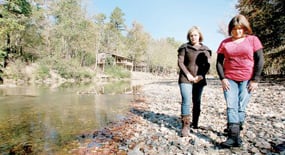LITTLE ROCK — Family members of three people who died in last year’s Albert Pike flood have filed a wrongful-death lawsuit against the U.S. Forest Service, citing negligence on the part of the agency and its employees - including those responsible for the creation of the RV campground known as Loop D, where most of the fatalities occurred.
Kay, Bruce and Debbie Roeder perished in the June 2010 flood, which occurred after a storm system dumped torrential rain on the Albert Pike Recreation Area in the Ouachita National Forest.
Seventeen other people, eight of them children, died when the Little Missouri River surged from its banks just before dawn, sweeping away cars, recreational vehicles and sleeping campers.
Document set
Albert Pike Flood
The two women suing the Forest Service are Theresa Roeder, the daughter of Kay Roeder; and Tara Roeder, who lost both of her parents and grandmother in the flash flood.
“From our point of view, the family’s concern is that there were a number of careless mistakes by the Forest Service where these deaths could have easily been avoided,” said Jim Freeman, one of the attorneys representing the Roeder family.
His law firm, Wilkes & McHugh, conducted an investigation and consulted with experts, Freeman said, adding, “We felt that the evidence was substantial and very compelling.”
Tracy Farley, spokesman for the Ouachita National Forest, said the U.S. Forest Service doesn’t comment on pending litigation.
Freeman said the federal agency hasn’t yet filed a response to the lawsuit.
Kay, Bruce and Debbie Roeder all lived in Luling, La.
Kay Roeder, 69, spent two weeks of each summer at Albert Pike. In June 2010, she was joined by son Bruce, 51, his wife, Debbie, 51, and their daughter, Tara, 30.
They set up camp in their RV at Loop D, which has electrical and water hookups.
The lawsuit describes a harrowing chain of events:
At 3 a.m., Tara Roeder awoke because their RV was rocking. She roused her parents and grandmother, who peered outside and noticed that the rising water was about to burst through the door oftheir vehicle.
Seconds later, something heavy slammed into the RV, which then floated before rolling over.
The family tried to walk up one side of the RV to right it, to no avail.
Something hit the RV again, and it imploded.
Kay, Bruce, Debbie and Tara Roeder were sucked into the roiling, debris-laden water.
Tara Roeder never saw the other three again.
“She clung to a tree, listening to people screaming and watching things float by in the darkness,” Freeman said.
The lawsuit alleges that former District Ranger James Watson used improper methods to determine the 100-year flood-plain elevation and that he “fraudulently misled” engineers and architects who built Loop D.
“And then, once it’s built, you have a problem where you have volunteer camp hosts,who are very nice people ... but you don’t give them a system to get a warning from the ranger station or weather service or anyone else,” Freeman said.
Freeman said the Forest Service also knew Loop D was especially prone to flashflooding, but there were no warning signs posted.
“All of these things are known to the Forest Service, and they didn’t put up so much as a warning sign?” Freeman asked. “My clients want to make sure that this is not forgotten, and that something’s done to make sure that other families throughout the country are not put in this situation just because there’s no oversight by the Forest Service.”
The lawsuit also alleges that the agency either didn’t have or didn’t follow its own policies and procedures for addressing flash floods, and that employees failed to letcampers know that a storm system that had caused flash flooding and deaths in Texas was headed into the area.
Employees also failed to let campers know that the National Weather Service had issued a flash-flood watch long before the system moved into Arkansas, the lawsuit states.
Arkansas, Pages 9 on 08/26/2011

